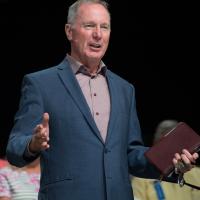Max Lucado Encourages Children in "Where'd My Giggle Go?"
Wave of Emotions
The COVID-19 pandemic has caused isolation, loneliness, and depression. While many adults know how to handle their feelings, most young children don’t. In his latest book, Where’d My Giggle Go? Max offers a fun way for kids to learn to process their emotions and turn their negative feelings into positive ones by helping others.
In the book, you follow a boy who wakes up grumpy and begins searching far and wide for his smile and giggle. Through his looking, he finds the best way to restore his happiness is to help others. As he offers smiles, hugs, and helps others, his joy is restored. The book teaches that both parents and children can cultivate joy and happiness in their lives by following the teaching of Jesus when he said, “It’s better to give than receive” (
).Max explains, “The happiest people I know are those who are most selfless. In my office, I keep a picture of a missionary who was a mentor to me. In the picture, my friend is sitting on a street corner in a third-world country, sharing the gospel with someone he met on the street, his face full of joy. When he would return from a mission trip, he would burst into my office, talking about all the people he’d met and how he’d been able to share Jesus with them. Nothing made him happier.”
The idea for Where’d My Giggle Go? came out of conversations that Max had with his grandchildren. He explains, “Being reminded that when we’re little, we don’t know that we have these wild waves going through us called emotions. We don’t understand why were aren’t happy one minute and then happy the next. I thought it would be great to write a story of a youngster dealing with emotions and trying to learn to manage those emotions in a healthy way.”
Helping Our Kids
Max says we can help children process their feelings by asking lots of questions, giving them time to talk, and by making sure they get plenty of rest. He adds, “You have everything you need at home. Whether you’re in a mansion or an apartment, or a mobile home—this is your world. Make it a place of joy. Talk to your children about God from the beginning. Let them see and hear you pray. When you go to the playground or camping, explore all the wonders of God’s amazing world. Let your world be enough. Then, as your child grows, guide them to care for the world and the people in it. When you show compassion to a friend or relative, include your child. He will learn by watching and doing what you do.” Max also says we can create a safe, happy environment by spending time with them and encouraging them to share what they’re thinking.
“Children are smart. They sense when things are out of sorts with a parent. Be honest, but don’t overshare. If you say ‘grandpa is in the hospital. I’m concerned about him, but I know the doctors are taking good care of him,’ follow up with ‘let’s pray about it,’” he shares.
Background
Max Lucado’s childhood was both idyllic and simple. Max was raised in Andrews, Texas, a town with a population smaller than the current membership of Oak Hills Church. Max’s dad was an oilfield mechanic and his mother a nurse. He spent much of his childhood chasing or being chased by his beloved brother Dee. Once Max became a teenager, rebellion kicked in. After one specific drunken night, Max began to wonder if there was more to life than parties and chasing girls. He believes now that if Jesus hadn’t changed his heart, alcoholism would have been in his future.
During undergraduate studies at Abilene Christian University (ACU), Max grew to realize God was bigger—and better than any rebellion. Max left ACU with two degrees and a heart for telling others about God and his faithfulness. Max's first ministry assignment was as the associate pastor of a small church in Miami, Florida. In that position, he developed his passion for people, ministry, and writing. He began writing when he was assigned a column in the church’s weekly newsletter. While in Florida Max married Denalyn, now his wife of more than three decades. Max and Denalyn moved to Rio de Janeiro in 1983 to help plant churches. During their five years in Brazil, Max continued to write, updating friends and family back home about their ministry. Eventually, Max gathered the Brazil newsletters and Florida columns into a manuscript and sent it off to fifteen publishers. After multiple rejection letters, one publisher finally said yes.




